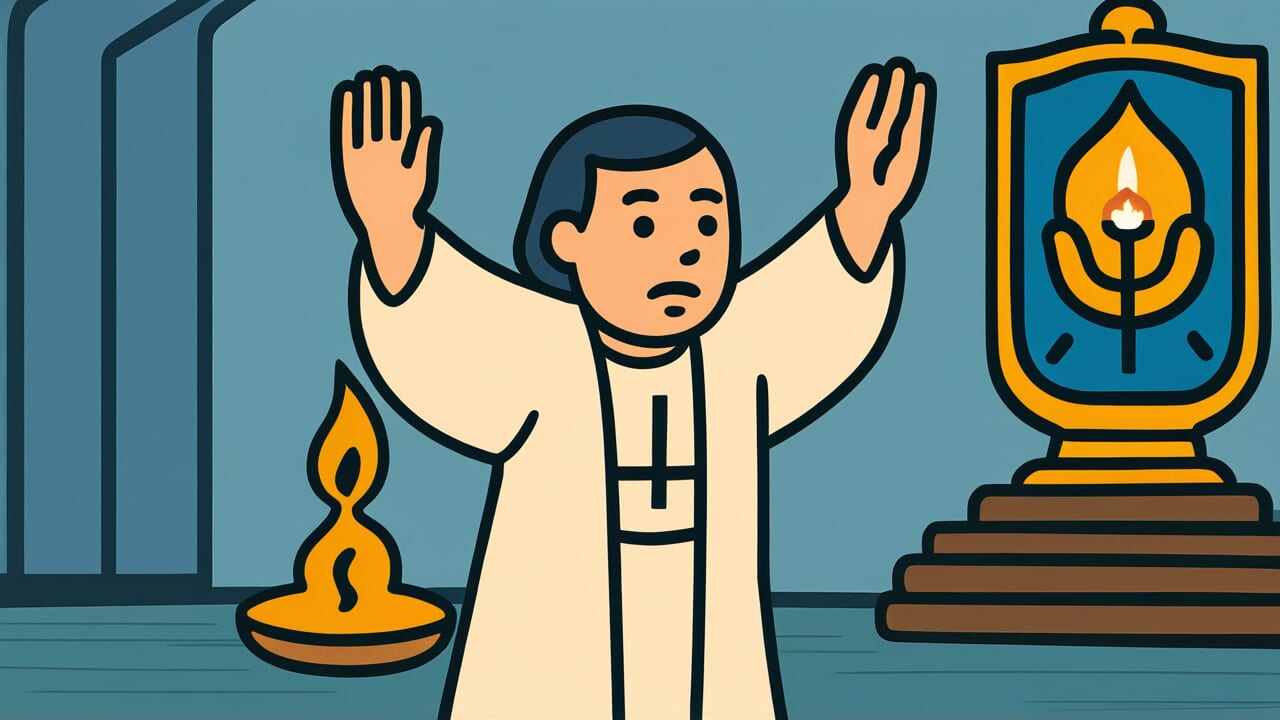How to Read “Even gods need prayers”
Kamisama ni mo norito
Meaning of “Even gods need prayers”
“Even gods need prayers” teaches that we must show respect and use polite words even when addressing gods. We should never skip formalities or neglect showing proper respect.
This proverb shows that no matter who you’re dealing with, even an all-knowing god, you should never skip courtesy or formalities. You must express respect through proper words.
People use this saying to warn others who try to skip politeness. Some think “we’re close friends” or “I’m higher in status” means they can drop formalities. This proverb corrects that thinking.
Today, we often value efficiency and practicality. We tend to skip formal things. But this proverb teaches us something important.
Formalities and courtesy aren’t just surface-level actions. They’re concrete ways to show respect to others. This saying reminds us to use polite words and attitudes with everyone, even now.
Origin and Etymology
No clear written records explain where this proverb came from. But we can learn interesting things by looking at the words themselves.
“Norito” means prayer words offered to gods in Shinto. Since ancient times, Japanese people have shown respect to gods through set forms and beautiful words.
At shrines, you can see priests solemnly reciting norito during ceremonies.
The key point is “even to gods.” Gods are all-knowing and all-powerful. They can see into human hearts. Yet even to such absolute beings, we must use proper words and show respect.
The message is clear: “Even for gods, you cannot skip courtesy or formalities.” This has a deeper meaning. If this is true for gods, it’s even more important between humans.
In traditional Japanese values, formalities and courtesy aren’t just surface actions. They’re important ways to show concrete respect to others.
This proverb was born from that cultural background. It carries the wisdom of that tradition.
Usage Examples
- A subordinate tried to skip a greeting email to a client. The boss warned him, saying “Even gods need prayers.”
- Even with close friends, you should properly express thanks. After all, even gods need prayers.
Universal Wisdom
“Even gods need prayers” teaches us universal wisdom about the true meaning of “formality” in human relationships.
We humans often think of formalities as “troublesome” or “not essential.” The closer we get to someone, the more we think “they’ll understand without me saying it” or “I can skip the formal stuff.”
But this proverb warns us against such thinking.
What’s interesting is the phrase “even to gods.” Gods can see into human hearts. They shouldn’t need formalities at all. Yet we should still show respect through the formality of prayers.
This shows that formalities themselves have deep meaning.
Formalities are ways to express invisible respect and gratitude in visible forms. Just thinking something in your heart doesn’t reach the other person. Only by putting it into words and showing it through actions does respect truly reach them.
This proverb has been passed down for so long because humans easily forget courtesy through “familiarity” and “taking things for granted.” No matter how close you are, no matter how much trust exists, you must never forget polite words and attitudes.
That’s the secret to keeping relationships healthy for a long time. Our ancestors understood this well.
When AI Hears This
Gods are all-knowing and all-powerful. They should understand human wishes without prayers. Using polite words seems wasteful at first glance.
But from a game theory perspective, this is extremely rational behavior.
The point is “spending cost.” Reciting prayers takes time and effort. The act itself proves “I’m serious.” In signaling theory by economist Michael Spence, actions that are hard to copy have high credibility.
For example, companies run expensive ads because companies selling poor products can’t afford such costs. This shows confidence in quality. Similarly, polite prayers to gods signal “this isn’t a casual wish.”
What’s interesting is that this signal becomes more important when the other party is absolutely superior. Information asymmetry exists between gods and humans.
Humans have limited ways to convey “how serious I am” to the other side. That’s why they need to be excessively polite. This has the same structure as modern job interviews, where capable students spend time researching companies to show enthusiasm.
In other words, prayers are calculated investments to prove your seriousness in relationships with information gaps.
Lessons for Today
This proverb teaches us about “the power of words” that we should value especially in the digital age.
Today, we can easily communicate through email and messaging apps. We tend to shorten our words. We finish with one stamp or reply with just “OK.”
It’s efficient, but does it fully express respect for the other person?
This proverb teaches the importance of using polite words with everyone, in any situation. This isn’t about being stiff or formal.
Adding “thank you very much,” saying “good work today”—these small word choices build richer relationships.
We especially forget courtesy with close people and family. But that’s exactly why we should consciously use polite words.
Why not start saying “thank you” one more time today to someone important to you? If even gods need prayers, your important people deserve heartfelt words too.
That’s the first step to building warm relationships.



Comments